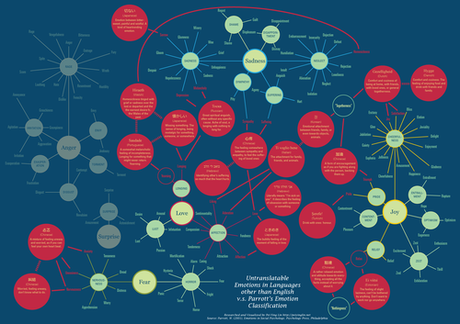
According to a recent Harvard/Google Study about the English lexicon, we have approximately 1,022,000 English words at our disposal. Despite this abundance, at times we lack the ability to convey every single emotion, concept, or situation in our lives. Pei-Ying Lin is a design student at the Royal College of Art, who mapped the relationships between English and non-English words that describe nuanced feelings. Lin used a linguistics model called W.Gerrod Parrott’s Emotion Classification, to anchor the map with five basic emotions along with related descriptive words. Lin then strategically placed the “untranslatable” words between the anchored emotions to help English speakers better comprehend their precise meanings.
We’ve compiled an additional list of words that lack direct English equivalents. Read on and tell us where you would position some of the following words on Lin’s map:
- Meraki - Greek: doing something with love, soul, and creativity. Putting yourself into whatever you’re doing.
- Ya’aburnee - Arabic: the hope that you’ll die before another person, because the difficulty of having to live without them. Literally translated as “you bury me.”
- Nunchi - Korean: emotional intelligence, or the subtle art of listening and gauging another’s mood.
- Gigli - Tagalog: an urge to pinch something that is cute.
- Pena ajena - Mexican Spanish: the embarrassment felt by watching someone else being humiliated.
- Voorpret - Dutch: the sense of enjoyment one feels in anticipation of an event.
- La douleur exquise - French: the heart-wrenching pain of wanting someone you can’t have.
- Waldeinsamkeit - German: the feeling of being alone in the woods. Described as peaceful, meditative, or at one with nature.
What are some other conditions you’ve experienced or heard about for which the English language has proven inadequate?
(via So Bad So Good & NPR Books)
